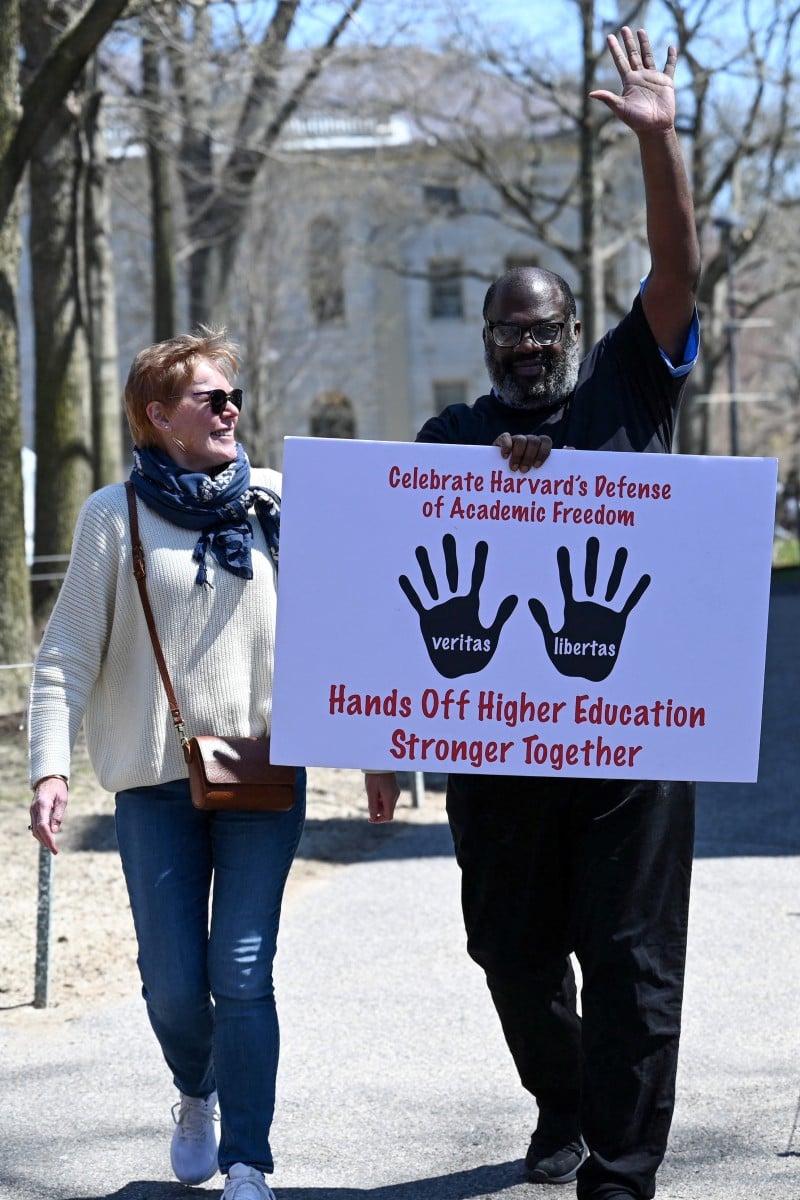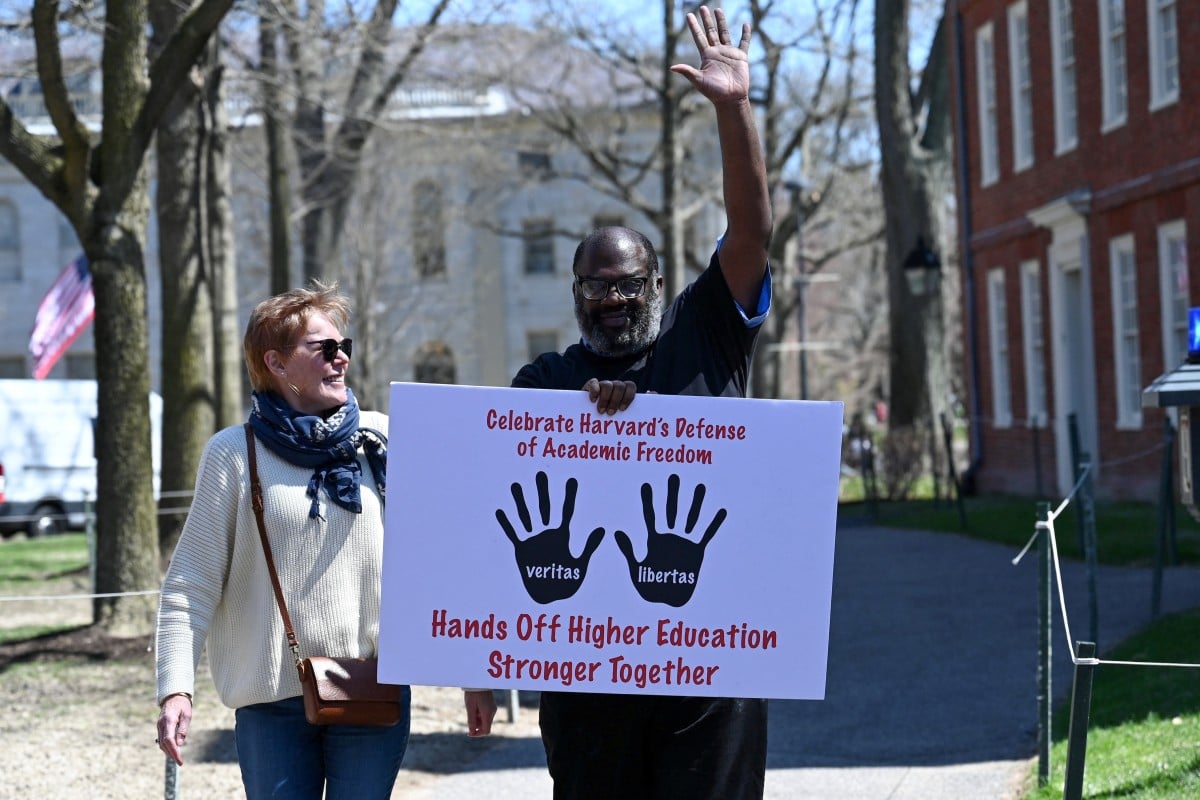
More than 1,000 international students in the US have had their visas or legal status revoked
Lawsuits filed against the Trump administration say the move has left hundreds of scholars at risk of detention and deportation
 People leave a protest against US President Donald Trump and student visas being revoked at Harvard University in Cambridge, Massachusetts, United States. Photo: Reuters
People leave a protest against US President Donald Trump and student visas being revoked at Harvard University in Cambridge, Massachusetts, United States. Photo: ReutersSeveral international students have filed lawsuits against the Trump administration, arguing the United States government denied them due process when it suddenly took away their permission to be in the US.
In recent weeks, more than 1,000 international students have had their visas or legal status revoked.
The federal government’s termination of students’ legal status has left hundreds of scholars at risk of detention and deportation. Their schools range from private universities like Harvard and Stanford to large public institutions and liberal arts colleges.
According to an Associated Press review of university statements, correspondence with school officials and court records, at least 1,024 students at 160 colleges, universities and university systems have had their visas revoked or their legal status terminated since late March.
In lawsuits against the Department of Homeland Security, students have argued the government lacked justification to cancel their visa or terminate their legal status.
US president Trump continues to threaten defiant Harvard University
Why is the US government cancelling international students’ visas?
Visas can be cancelled for a number of reasons, but universities say some students are being singled out over infractions as minor as traffic violations, including some long in the past.
In some cases, students say it’s unclear why they were targeted.
“The timing and uniformity of these terminations leave little question that DHS (Department of Homeland Security) has adopted a nationwide policy, whether written or not, of mass termination of student [legal] status,” American Civil Liberties Union of Michigan lawyers wrote in a lawsuit on behalf of students at Wayne State University and the University of Michigan.
In New Hampshire, a federal judge issued a restraining order last week in the case where a Dartmouth College computer science student from China, Xiaotian Liu, had his status terminated by the government. Lawyers have filed similar challenges in federal court in Georgia and California.
Homeland Security officials did not respond to a message seeking comment.
In some high-profile cases – including the detention of Columbia University activist Mahmoud Khalil – US president Donald Trump’s administration has argued it should be allowed to deport non-citizens over involvement in pro-Palestinian activism.
But in the vast majority of visa revocations, universities say there is no indication that affected students had a role in protests.
“What you’re seeing happening with international students is really a piece of the much greater scrutiny that the Trump administration is bringing to bear on immigrants of all different categories,” said Michelle Mittelstadt, director of public affairs at the Migration Policy Institute.
President Trump signs order to ‘eliminate’ the US Education Department
How do student visas work?
Students from other countries must meet a series of requirements to obtain a student visa, usually an F-1. After gaining admission to a school in the US, students go through an application and interview process at a US embassy or consulate abroad.
Students on an F-1 visa must show they have enough financial support for their course of study in the US. They have to remain in good standing with their academic programme and are generally limited in their ability to work off-campus during their programme.
Entry visas are managed by the State Department. Once in the US, international students’ legal status is overseen by the DHS’s student and exchange visitor programme.
In recent weeks, leaders at many universities learned the legal residency status of some of their international students had been terminated when university staff checked a database managed by Homeland Security.
In the past, university officials said, legal statuses were typically updated after universities told the government the students were no longer studying at the school.
The Lens: Trump’s executive orders on DEI spark major lawsuit
Students told to leave the country
Historically, students who had their visas revoked were allowed to keep their legal residency status and complete their studies.
The lack of a valid entry visa only limited their ability to leave the US and return, something they could reapply for with the State Department.
But if a student has lost legal residency status, they risk detention by immigration authorities. Some students have already left the country, abandoning their studies to avoid arrest.
Higher education leaders worry arrests and visa revocations could discourage students overseas from pursuing higher education in the United States.
The lack of clarity of what is leading to revocations can create a sense of fear among students, said Sarah Spreitzer, vice-president of government relations at the American Council on Education.
“The very public actions that are being taken by ICE (Immigration and Customs Enforcement) and the Department of Homeland Security around some of these students – where they are removing these students from their homes or from their streets – that’s not usually done unless there is a security issue when a student visa is revoked,” she said. “The threat of this very quick removal is … new.”